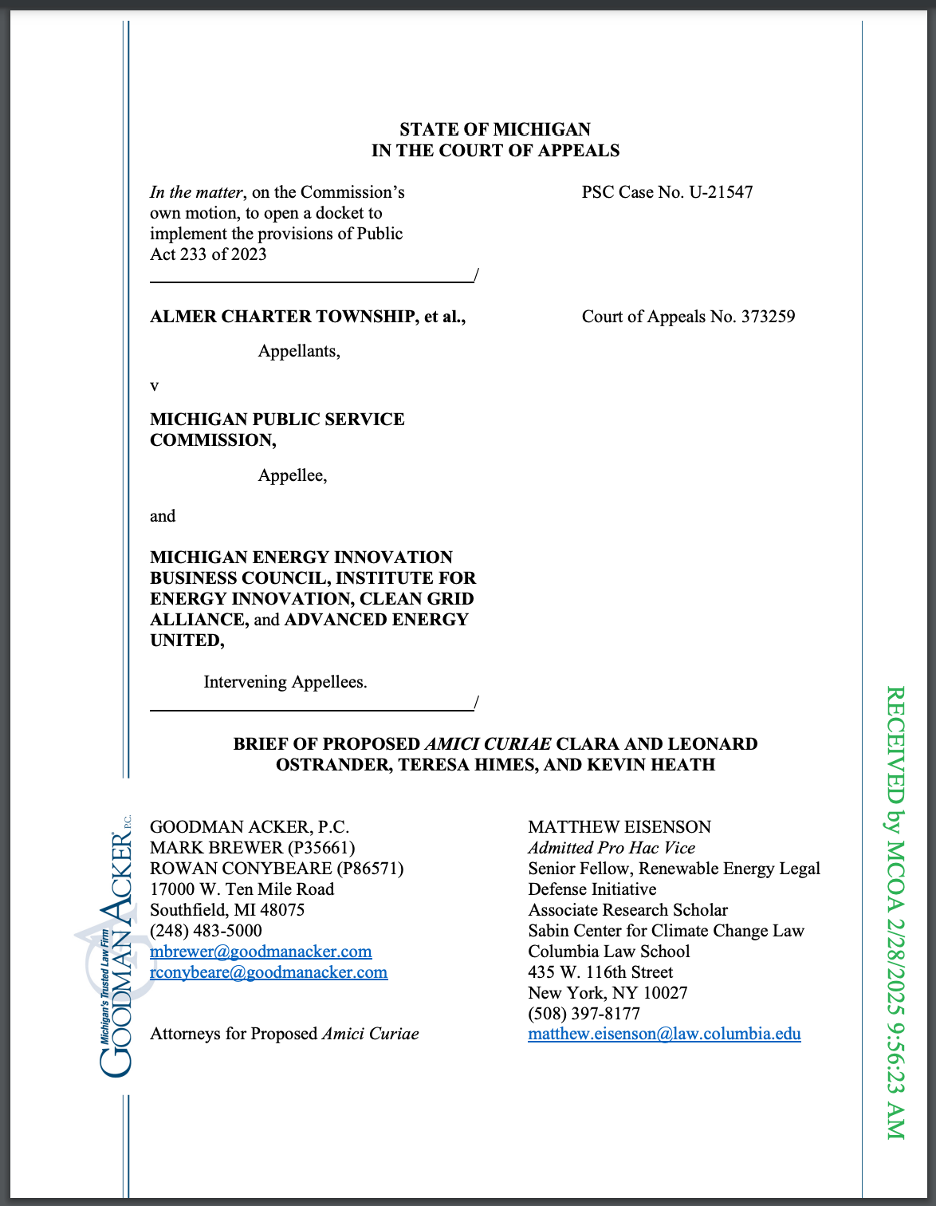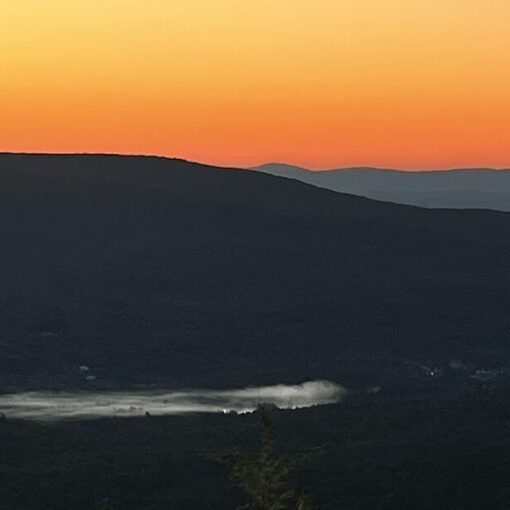Over the last five years, several states, including New York (2020), California (2022), Illinois (2023), and Michigan (2023) have adopted comprehensive permitting reforms that curtail the power of local governments to block development of large-scale renewable energy projects.

In two states, New York and Michigan, local governments have sued to block implementation of these reforms. In New York, a lawsuit challenging regulations that were promulgated by a state agency to implement the siting law was finally defeated in November 2024, after multiple appeals. In Michigan, a similar challenge is pending before the Michigan Court of Appeals. The Sabin Center has submitted amicus briefs supporting implementation of siting reforms in both cases (see here and here for briefs submitted in the New York case and here, here, and here for our briefs in the Michigan case).
This blog post provides an overview of the key issues at play in the Michigan case. The case—Almer Charter Township et al. v. Michigan Public Service Commission et al—was brought by a group of 72 townships and 7 counties who are seeking to vacate an order issued by the Michigan Public Service Commission (PSC) to implement the new state siting law (Public Act 233 of 2023 or PA 233). The local governments are challenging several aspects of the PSC’s order, including, most importantly, the PSC’s interpretation of the term “compatible renewable energy ordinance” or “CREO” under the statute. On a concrete level, the question at issue is what types of restrictions local governments will be allowed to impose on renewable energy and battery storage projects under PA 233 without being forced to cede jurisdiction to the PSC. In its order, the PSC determined that—in order to qualify as a CREO—a local ordinance “may only contain the setback, fencing, height, sound, and other applicable requirements expressly outlined in [the statute], and may not contain additional requirements beyond those specifically identified.” The local governments argue that this interpretation is not supported by the statute and that they should be allowed to impose other types of restrictions.
Public Act 233
As described in a previous blog post, renewable energy and battery storage facilities in Michigan were historically sited, approved, and permitted at the township and county level, with limited oversight from the State. In response to an increasing number of local restrictions on renewable energy development, in November 2023, Governor Whitmer signed legislation to reform the siting process. PA 233, which went into effect in November 2024, establishes limits on the types of restrictions that local governments can impose on solar, wind, and battery storage projects and allows the PSC to assume control over permitting when local governments exceed those limits.
Critically, PA 233 allows developers to submit their applications directly to the PSC—thus bypassing the local approval process—unless the local government where the project is to be located adopts a compatible renewable energy ordinance (CREO) that is “no more restrictive” than state requirements. When the PSC assumes control over an application, it is authorized to preempt any local restrictions that would otherwise apply.
The statute defines a CREO as follows:
“Compatible renewable energy ordinance” means an ordinance that provides for the development of energy facilities within the local unit of government, the requirements of which are no more restrictive than the provisions included in section 226(8). A local unit of government is considered not to have a compatible renewable energy ordinance if it has a moratorium on the development of energy facilities in effect within its jurisdiction.
Section 226(8) of the statute, for its part, establishes clear benchmarks for certain types of restrictions, such as setbacks, fencing requirements, height limits, and noise limits, but it does not explicitly address other types of restrictions. Some types of restrictions that are not explicitly addressed in Section 226(8), such as ordinances banning solar projects in agricultural zoning districts, could be far more restrictive than those that are explicitly addressed. However, the statutory definition provides only that a CREO cannot contain any requirements “more restrictive” than the enumerated requirements.
In July 2024, the Sabin Center and colleagues from the University of Detroit Mercy submitted comments recommending that the PSC issue interpretive guidance on the definition of a CREO. Those comments explained that, in the absence of such guidance, local governments were continuing to adopt the types of severely restrictive local ordinances that PA 233 was intended to rein in.
The PSC’s October 2024 Order Interpreting PA 233
On October 10, 2024, the PSC issued an order to implement the new siting process. Among other things, the Order clarified the definitions of certain terms in PA 233, including by clarifying what can—and cannot—be included in a CREO. According to the PSC:
A CREO under Act 233 may only contain the setback, fencing, height, sound, and other applicable requirements expressly outlined in Section 226(8), and may not contain additional requirements beyond those specifically identified in that section.
The PSC cited several bases for its determination that a CREO may not contain additional requirements beyond those specified in Section 226(8). It concluded that, when looking at the statute as a whole, “[o]ther provisions in Act 233 reinforce this limitation.” The PSC found, for example, that the Legislature had made clear that local governments lacked the authority to enforce any restrictions other than the setback, fencing, height, sound, and other requirements set out in Section 226(8). Indeed, the statute provides that, if a project satisfies the criteria set out in Section 226(8) but a local government rejects it for some unrelated reason—such as noncompliance with a ban on siting solar in agricultural zoning districts—then the developer is allowed to submit its application to the PSC. The PSC reasoned that if local governments cannot enforce such restrictions, then local governments cannot include them in a CREO:
Had the Legislature intended to permit local units to include additional requirements beyond those identified in Section 226(8) of Act 233, it would not have restricted the Commission’s authority to site energy facilities, in part, on the basis that a local unit denied an application for reasons beyond “the requirements of section 226(8).”
In effect, the PSC found that the whole text canon of statutory interpretation supported its interpretation of CREO.
Almer Charter Township v. Michigan Public Service Commission
On November 8, 2024, a group of 72 townships and 7 counties in Michigan filed an appeal in the Michigan Court of Appeals challenging the PSC’s Order. The appeal (docket here) seeks to vacate the PSC’s Order on procedural and substantive grounds. On procedural grounds, the appeal argues that the Order was a “rule” under the Michigan Administrative Procedures Act and that the PSC failed to undergo proper rulemaking procedures in issuing the Order. On substantive grounds, the appeal argues that the Order “unlawfully and unreasonably redefines” CREO and other terms. This section will describe: (A) the local governments’ motion for a preliminary injunction, which was denied; and (B) the parties’ briefing on the merits, which has been submitted to the court.
A. Motion for Preliminary Injunction
Less than two weeks after filing their appeal, the local governments moved for a preliminary injunction (or stay) to stop the PSC Order from going into effect. In their motion, the local governments argued that they would suffer irreparable harm if the Order were allowed to go into effect and that the PSC would not be harmed if the Order were enjoined.
Together with local counsel Mark Brewer and Rowan Conybeare, the Sabin Center filed an amicus brief on behalf of four landowners in Milan Township, Michigan (the “Milan Township Landowners”), urging the court to reject the motion. The brief highlighted harms to landowners and the state that would result from an injunction. Meanwhile, a coalition of business and environmental groups, including Michigan Energy Innovation Business Council (MEIBC), intervened as parties in support of the PSC Order.
On January 14, 2024, the Court of Appeals rejected the motion for a preliminary injunction in a short order, allowing the PSC Order to take effect. Links to the main briefs filed on this motion are provided below.
|
BRIEFS FILED ON THE MOTION FOR A PRELIMINARY INJUNCTION |
|
| Supporting Preliminary Injunction | Opposing Preliminary Injunction |
| Appellants Almer Charter Township et al. (see opening brief here and reply brief here) | Appellee Michigan PSC (see brief here) |
| Intervening Appellees Michigan Energy Innovation Business Council, Institute for Energy Innovation, Clean Grid Association, and Advanced Energy United (see brief here) | |
| Milan Township Landowners (see amicus brief here) | |
B. Briefing on the Merits
While the motion for a preliminary injunction was still pending, the local governments filed a brief on the merits asserting their procedural and substantive arguments. The PSC and intervening appellees responded to rebut these arguments. On the procedural claim, they argued, among other things, that the Order was an interpretative statement that is not subject to formal rulemaking procedures under the Michigan Administrative Procedures Act. On the substantive claims, they defended the rationale for the interpretation set out in the Order.
In addition, a total of 11 amicus briefs on the merits of the appeal have been submitted. The amicus brief of the Milan Township Landowners, submitted by the Sabin Center and local counsel, highlighted the landowners’ personal experiences with the dysfunctional siting process that preceded PA 233. The brief also highlighted examples of ongoing efforts by local governments to thwart the implementation of PA 233 by evading the statute’s limits on the restrictions that can be included as part of a CREO. Further, the brief explained why the PSC’s Order will help to curb ongoing abuses of the PA 233 siting process. Links to these briefs are available below.
|
BRIEFS FILED ON THE MERITS OF THE APPEAL |
|
| Opposing PSC Order | Supporting PSC Order |
| Appellants Almer Charter Township et al. (see opening brief here and reply brief here) | Appellee Michigan PSC (see brief here) |
| Michigan House of Representative (see amicus brief here) | Intervening Appellees Michigan Energy Innovation Business Council, Institute for Energy Innovation, Clean Grid Association, and Advanced Energy United (see brief here) |
| Michigan Farm Bureau (see amicus brief here) | Michigan Environmental Council, Natural Resources Defense Council, Sierra Club, Evergreen Action (see amicus brief here) |
| Michigan Townships Association (see amicus brief here) | Michigan Regional Council of Carpenters & Millwrights (see amicus brief here) |
| Michigan Association of Counties (see amicus brief here) | Milan Township Landowners (see amicus brief here) |
| Our Home, Our Voice, Inc. (see amicus brief here) | Senator Sam Singh, Senator Erika Geiss, Representative Ranjeev Puri, and Representative Laurie Pohutsky (see amicus brief here) |
| Michigan Conservative Energy Forum (see amicus brief here) | |
| National Grid Renewables Development (see amicus brief here) | |
Ultimately, the outcome of the appeal could have a significant impact on the deployment of large-scale renewables and battery storage in Michigan. A decision upholding the PSC order could make it more difficult for local governments to block renewable energy projects, by clarifying that they cannot impose certain types of restrictions on such projects. By contrast, a decision vacating the PSC order could make it easier for local governments to block such projects.
Updated 4/16/25 to provide links to additional amicus briefs.
Matthew Eisenson is a Senior Fellow at the Sabin Center for Climate Change Law, where he leads the Renewable Energy Legal Defense Initiative (RELDI).




